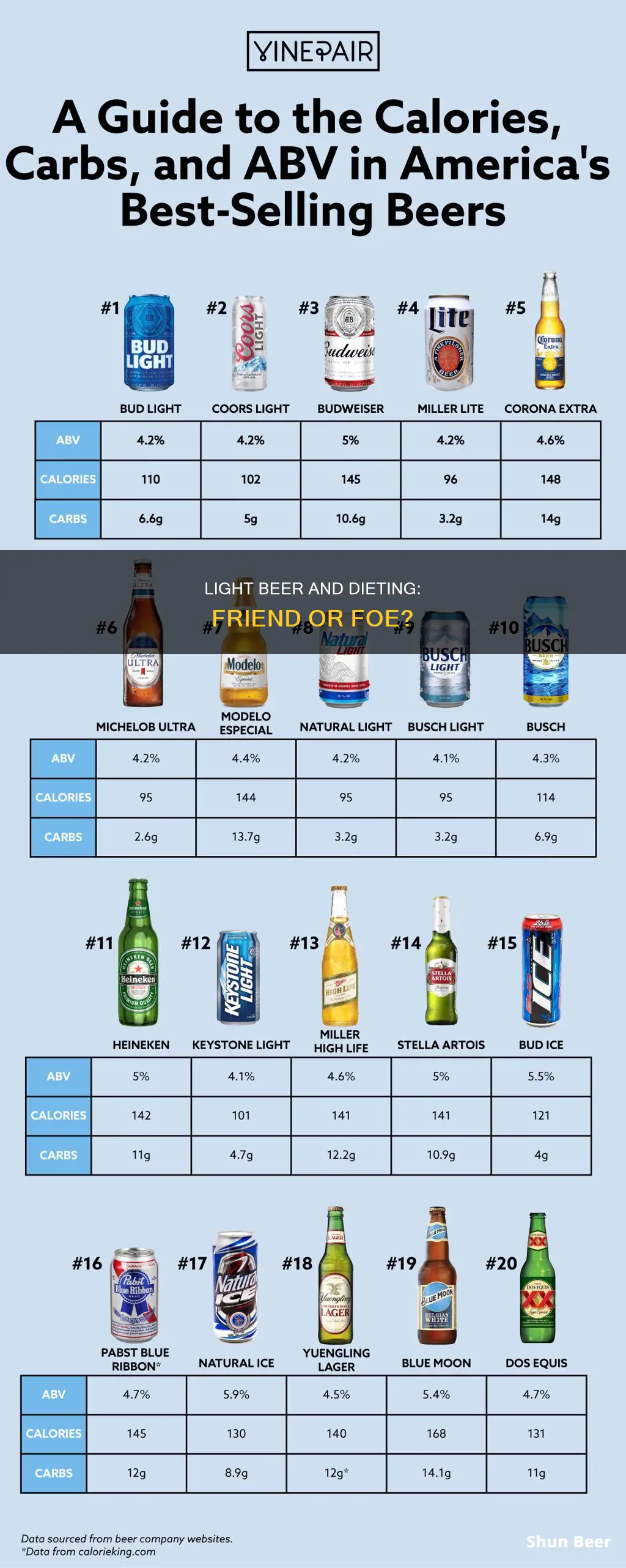
Beer and weight gain often go hand-in-hand, and many people trying to lose weight cut out alcohol altogether. However, drinking light beer can be a great way to reduce your calorie intake and still enjoy a drink. The USDA lists 103 calories in a light beer, compared to 153 in a regular beer. Light beers also contain about half the carbohydrates of regular beer, and lower-carb diets are often associated with weight loss.
What You'll Learn

Light beer has fewer calories than regular beer
Beer is often viewed as empty calories, but it can be incorporated into a weight-loss plan. Beer and weight gain are associated because alcohol reduces your inhibitions and stimulates your appetite, leading to increased calorie intake. However, light beers have fewer calories than regular beers, so they can be a better option for those watching their weight.
The USDA lists 103 calories in a light beer, compared to 153 in a regular beer. This simple switch can help keep your daily calorie intake in check. Light beer also contains about half the carbohydrates of regular beer, and lower-carb diets are often associated with weight loss. Additionally, the alcohol content is usually slightly lower in light beers, and since the higher the ABV, the higher the calories, this further reduces the caloric content.
It is important to note that regulators do not require calorie information on beer containers, so it can be challenging to determine the exact calorie content of different beers. However, some brewers voluntarily provide this information on their websites, especially if they are marketing a lower-calorie product.
When trying to lose weight, it is recommended to burn or cut about 500 calories a day to lose about a pound a week. While it is possible to drink beer and still lose weight, it is harder to create a caloric deficit if you drink every day. In addition to switching to light beer, other ways to reduce calories include drinking less frequently, reducing portion sizes, and choosing lower-carb beers.
Drinking Beer While on Norvasc: What You Need to Know
You may want to see also

Alcohol can increase your appetite
Beer is a popular alcoholic beverage, but it can be challenging to incorporate into a weight-loss plan due to its calorie content. While light beer has fewer calories than regular beer, drinking any type of beer can contribute to weight gain if not consumed in moderation.
- Alcohol suppresses the oxidation of fatty acids, which play a role in appetite regulation.
- It increases short-term thermogenesis, or calorie utilisation for heat production, which can make you feel hungry again faster than usual.
- It stimulates or inhibits neurochemical systems that regulate appetite. Specifically, alcohol affects the hormones Leptin and GLP-1, which suppress appetite.
- Alcohol stimulates neurons in the brain's hypothalamus that are associated with starvation and extreme hunger sensations.
- It reduces self-control, making it more likely to give in to food cravings and overeating.
Additionally, drinking alcohol is often associated with social gatherings, celebrations, and relaxation, which can influence eating habits and contribute to increased appetite.
To manage alcohol consumption while dieting, it is recommended to drink in moderation, pace yourself, drink water, eat nutritious meals, and prepare healthy snacks in advance.
Beer After Gallbladder Removal: What You Need to Know
You may want to see also

Drinking beer can lead to weight gain
Secondly, alcohol interferes with the body's ability to burn fat. Normally, the liver prioritises breaking down fat, but when alcohol is present, it becomes the liver's main priority to eliminate, meaning fat metabolism is reduced. This can lead to an accumulation of fat, particularly in the abdominal region, contributing to the well-known "beer belly".
Thirdly, alcohol can increase appetite and reduce inhibitions, leading to increased food consumption. Alcohol may activate hormones that signal appetite, hunger and stress, such as cortisol, and can lower blood sugar levels, increasing cravings for high-carb foods. This can result in greater overall calorie intake, further contributing to weight gain.
Finally, excessive alcohol intake is often associated with other unhealthy lifestyle factors, such as poor dietary choices and a lack of physical activity, which can compound the risk of weight gain. Therefore, it is important to monitor alcohol consumption as part of a balanced diet and healthy lifestyle, particularly if weight management is a concern.
Beer as a Hair Conditioner: Does it Work?
You may want to see also

Light beer contains slightly less alcohol than regular beer
Light beer can be a good option for those who want to enjoy a drink while dieting, as it contains fewer calories and slightly less alcohol than regular beer. According to the USDA, a light beer has about 103 calories, compared to 153 calories in a regular beer. This simple switch can help keep your daily calorie intake in check and allow you to enjoy a drink without derailing your weight loss efforts.
The difference in calories between light and regular beer is significant, with the regular version containing about 40% more calories. This is because, during the fermentation process, much of the carb content in beer is converted to alcohol. Therefore, a higher alcohol content will result in more calories. Light beers have a slightly lower alcohol content, which contributes to their reduced calorie count.
In addition to having fewer calories, light beers also contain about half the carbohydrates of regular beers. Lower-carb diets are often associated with weight loss, as they can help your body burn alcohol more quickly. This makes light beer a healthier option for those watching their weight.
However, it's important to note that the health benefits of light beer are related to light to moderate intake only. Heavy alcohol consumption, including beer, can increase your risk of heart disease, stroke, weight gain, and other health issues. To enjoy the health benefits of light beer, it's recommended to limit your intake to one drink per day for women and two drinks per day for men.
The Magic of Beer Fob: How It Works
You may want to see also

Drinking beer can increase your risk of health issues
Heavy and binge drinking is associated with a higher risk of early death, alcohol dependence or alcohol use disorder, depression, liver disease, weight gain, and cancers.
According to WebMD, drinking more than 30 grams of alcohol per day can raise your risk of liver diseases like cirrhosis, a condition characterised by scarring. Research also suggests that heavy and binge drinkers have a significantly higher risk of depression compared with moderate drinkers and non-drinkers.
Heavy alcohol consumption can also cause:
- Blackouts
- Drowsiness
- Low blood sugar
- Vomiting
- Other serious problems
Drinking large amounts of alcoholic beer long-term can cause many serious health problems, including:
- Dependence
- Liver problems
- Certain types of cancer
Drinking Beer on 21-Day Fix: Is It Possible?
You may want to see also
Frequently asked questions
Yes, but in moderation. Light beers have fewer calories than regular beers, but they can still contribute to weight gain if consumed in excess.
The USDA lists 103 calories in a light beer, compared to 153 in a regular beer.
Light beers also contain about half the carbohydrates of regular beers, and lower-carb diets are often associated with weight loss.
Yes, drinking one or two standard beers per day may have positive effects on your heart, bones, blood sugars, and dementia risk.
Yes, beer is associated with weight gain and obesity, and it can be easy to overdo it on the calories. Beer also tends to increase your appetite, which can lead to consuming more calories from snacks and other foods.







